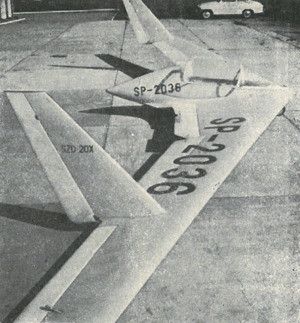SZD-20X Wampir II
The SZD-20x Wampir II (Szybowcowy Zakład Doświadczalny - Glider Experimental Works) was a single-seat tail-less research glider designed and built in Poland from 1959.
| SZD 20x Wampir 2 | |
|---|---|
 | |
| Role | Glider |
| National origin | Poland |
| Manufacturer | PZL Bielsko |
| Designer | Jan Dyrek |
| First flight | 9 September 1959[1] |
| Number built | 1 |
Development
The SZD-20X Wampir II (vampire II) was designed to compare a flying wing designed to Standard class rules with a more conventional standard class glider. Main designer was Jan Dyrek. Based on experience with the earlier SZD-6X Nietoperz and SZD-13 Wampir tail-less gliders, the SZD-20X was an all wood flying wing, with the pilot sitting in a pod extending aft of the trailing edge on the centreline, and large swept fins & rudders at approx 2/3 span on each wing.
The SZD-20X was associated with the number 15, having a 15m span, aspect ratio of 15 and wing area of 15m², whether this was by design or accident is not known.[1] Early flight trials commenced with hops towed behind a car to test control responses, followed by an aero-tow launch on 9 September 1959, piloted by Adam Zientek. Flight trials revealed a marked sensitivity to turbulence resulting in flutter, and during trials at stalling speed, the SZD-20X entered a spin, which the rudders were unable to recover the aircraft from, only when the pilot shifted his weight as far forward as he could, did the SZD-20X recover from the spin.[1] Flying in the SZD-20X continued until 6 October 1959, when turbulence-induced flutter tore the aircraft apart, the pilot escaping with parachute.[1]
Specifications (Standard Austria)

Data from The World's Sailplanes:Die Segelflugzeuge der Welt:Les Planeurs du Monde Volume II[1][2]
General characteristics
- Crew: 1
- Length: 6.2 m (20 ft 4 in)
- Wingspan: 15 m (49 ft 3 in)
- Height: 1.7 m (5 ft 7 in)
- Wing area: 15 m2 (160 sq ft)
- Aspect ratio: 15
- Airfoil: NACA 23112
- Empty weight: 171 kg (377 lb) equipped
- Gross weight: 268 kg (591 lb)
Performance
- Stall speed: 50 km/h (31 mph, 27 kn)
- Never exceed speed: 200 km/h (120 mph, 110 kn)
- Aerotow speed: 120 km/h (74.6 mph; 64.8 kn)
- g limits: +4.5 -2 at 91 km/h (56.5 mph; 49.1 kn)
- Maximum glide ratio: 24.4 at 82 km/h (51.0 mph; 44.3 kn)
- Rate of sink: 0.84 m/s (165 ft/min) at 72 km/h (44.7 mph; 38.9 kn)
- Wing loading: 17.8 kg/m2 (3.6 lb/sq ft)
See also
Aircraft of comparable role, configuration and era
Related lists
Notes
- Pietchowski, Piotr. "SZD-20x Wampir 2" (in German). www.piotrp.de. Retrieved 8 April 2013.
- Shenstone, B.S.; K.G. Wilkinson (1963). The World's Sailplanes:Die Segelflugzeuge der Welt:Les Planeurs du Monde Volume II (in English, French, and German) (1st ed.). Zurich: Organisation Scientifique et Technique Internationale du Vol a Voile (OSTIV) and Schweizer Aero-Revue. pp. 34–36.
References
- Pietchowski, Piotr. "SZD-20x Wampir 2" (in German). www.piotrp.de. Retrieved 8 April 2013.
- Shenstone, B.S.; K.G. Wilkinson (1963). The World's Sailplanes:Die Segelflugzeuge der Welt:Les Planeurs du Monde Volume II (in English, French, and German) (1st ed.). Zurich: Organisation Scientifique et Technique Internationale du Vol a Voile (OSTIV) and Schweizer Aero-Revue. pp. 34–36.
Further reading
- Taylor, J. H. (ed) (1989) Jane's Encyclopedia of Aviation. Studio Editions: London. p. 29
External links
| Wikimedia Commons has media related to SZD-20 Wampir 2. |